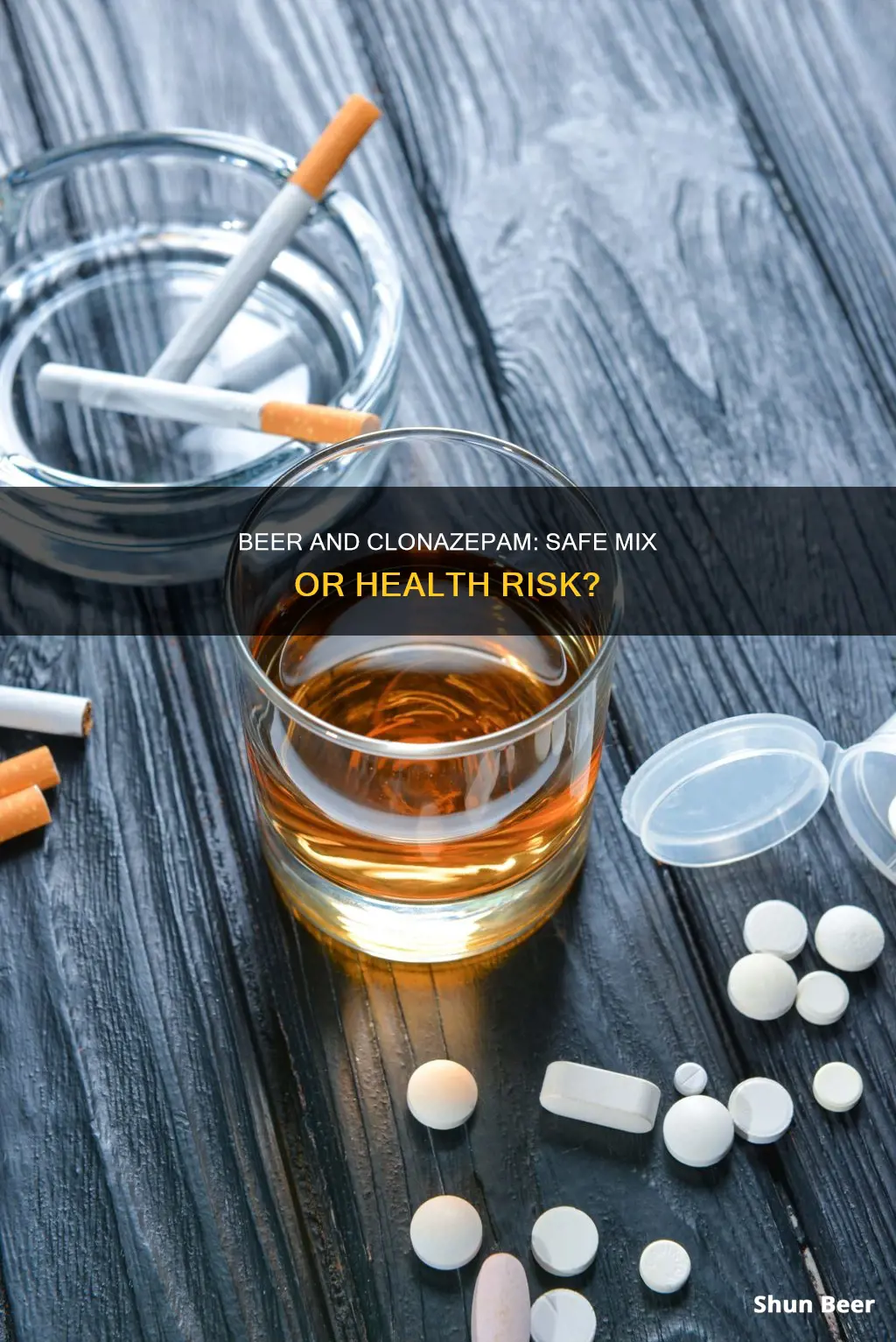
Clonazepam, also known as Klonopin, is a drug that is often prescribed for convulsive and panic disorders, as well as other mental health disorders. It is a type of benzodiazepine that acts as a tranquilizer in the body. Mixing clonazepam with alcohol can lead to dangerous side effects and health complications, including overdose and even death. Both clonazepam and alcohol are central nervous system depressants, and when taken together, they can cause problems with concentration, seizures, and loss of consciousness. Since both substances influence the GABA receptors in the brain, their effects are multiplied, increasing the risk of accidental overdose. Therefore, it is highly recommended to refrain from drinking alcohol while taking clonazepam.
| Characteristics | Values |
|---|---|
| Mixing Clonazepam and Alcohol | Dangerous |
| Clonazepam Classification | Benzodiazepine, tranquilizer |
| Clonazepam Treatment Uses | Panic disorders, compulsive disorders, depression, psychological disorders, convulsive disorders |
| Clonazepam Effects | Slows breathing and heart rate, increased anxiety, paranoia, suicidal thoughts, seizures, memory problems |
| Alcohol Effects | Interrupts communication between nerve cells, decreases brain activity, affects judgement and speech |
| Mixing Clonazepam and Alcohol Effects | Heightened effects of Clonazepam, including severe memory loss, increased likelihood of seizures, loss of consciousness, dizziness, fainting, problems concentrating, overdose |
| Treatment for Addiction | Rehab facilities, inpatient and outpatient programs, residential treatment, therapy, counseling |
What You'll Learn
- Clonazepam and alcohol are both central nervous system depressants
- Mixing the two can lead to dangerous complications like overdose
- Combining the two can lead to severe memory loss and increase the likelihood of a seizure
- It can also cause increased anxiety, paranoia, and suicidal thoughts
- Treatment options are available for those suffering from co-occurring addiction

Clonazepam and alcohol are both central nervous system depressants
Clonazepam, also known as Klonopin, is a benzodiazepine drug. Benzodiazepines are central nervous system depressants. They are often prescribed to treat panic disorders, compulsive disorders, depression, and psychological disorders. Clonazepam is highly habit-forming and can cause increased anxiety, paranoia, and suicidal thoughts and impulses. It is extremely dangerous to mix clonazepam with alcohol, which is also a central nervous system depressant.
Alcohol is a depressant that has sedative effects on the body. When it enters the body, alcohol is absorbed into the bloodstream and interrupts communication between nerve cells. This is why those who consume excessive amounts of alcohol may become uncoordinated, weak, and sluggish. Alcohol also affects the parts of the brain that control judgment and speech.
Clonazepam also slows down the brain's activity and causes a hypnotic effect. It relaxes muscles and slows down the respiratory system, including breathing and heart rate. Combining clonazepam with alcohol can lead to severe memory loss, loss of consciousness, and an increased likelihood of a seizure. It can also worsen existing mental disorders such as panic attacks and make them more difficult to treat.
The combination of clonazepam and alcohol can also lead to dangerous side effects such as problems concentrating, loss of motor skills and bodily coordination, and disorientation and confusion. It increases the risk of a fatal overdose, as both substances influence the GABA receptors in the brain, multiplying the effects of both drugs. This means that a smaller amount of each substance is needed to overdose.
It is highly recommended to refrain from drinking alcohol if you are currently taking clonazepam. If you or someone you know is mixing clonazepam and alcohol, it may be time to seek professional help.
Shingles and Beer: A Safe Mix?
You may want to see also

Mixing the two can lead to dangerous complications like overdose
Mixing clonazepam and alcohol can lead to dangerous complications and side effects, including the risk of overdose. Both substances are central nervous system depressants, which means that taking them together can lead to a host of problematic side effects. For example, clonazepam slows down the respiratory system, and when combined with alcohol, this can cause breathing difficulties and even stopped breathing, which can be fatal. The combination can also lead to damage to the brain, heart, and other organs.
Both clonazepam and alcohol affect the GABA receptors in the brain, which multiply the effects of both substances. This means that it takes a smaller amount of each substance to overdose. The combination can also lead to blackouts, during which a person may unintentionally consume more clonazepam, further increasing the risk of overdose.
Other side effects of mixing clonazepam and alcohol include loss of motor skills and bodily coordination, disorientation, confusion, dizziness, fainting, seizures, and problems with focus and concentration. Both substances can also impair thinking and judgment, and increase the risk of falls, driving accidents, and risky sexual behaviour.
The effects of mixing clonazepam and alcohol can be unpredictable and stronger than the effects of either substance alone. It is highly recommended to refrain from drinking alcohol if you have been prescribed clonazepam, as it will heighten the effects of the drug.
Mixing Beer and Rum: A Safe Drinking Adventure?
You may want to see also

Combining the two can lead to severe memory loss and increase the likelihood of a seizure
Clonazepam, also known as Klonopin, is a drug that is often prescribed for convulsive disorders, panic disorders, and other mental health disorders. It is a type of benzodiazepine that acts as a tranquilizer in the body. Benzodiazepines are central nervous system depressants, meaning that they slow down brain activity.
Alcohol is also a central nervous system depressant. It is absorbed by the bloodstream and interrupts communication between nerve cells, which is why excessive alcohol consumption leads to uncoordinated movements, weakness, and sluggishness.
Combining clonazepam and alcohol can lead to severe memory loss and increase the likelihood of a seizure. Both substances have similar effects on the body, and when taken together, they intensify each other's side effects. For example, both clonazepam and alcohol can slow down breathing and heart rate. When combined, this can happen very quickly, leading to fainting or loss of consciousness.
Additionally, both substances affect the parts of the brain that control judgment and speech, and both are highly habit-forming. Mixing clonazepam and alcohol can lead to dangerous complications, including an increased risk of accidental and fatal overdose. It can also worsen existing mental disorders, such as panic attacks.
The combination of clonazepam and alcohol can also lead to blackouts, where individuals lose their memory and may unintentionally consume more clonazepam, further increasing the risk of overdose. Therefore, it is highly recommended to refrain from drinking alcohol if you have been prescribed clonazepam.
Beer and Kidney Failure: Is There a Link?
You may want to see also

It can also cause increased anxiety, paranoia, and suicidal thoughts
Clonazepam, or Klonopin, is a drug that is classified as a benzodiazepine, which acts as a tranquilizer in the body. It is used to treat panic disorders, compulsive disorders, depression, and psychological disorders. The drug works quickly and is often taken for extended periods, as it treats chronic disorders without curing them. It is also highly habit-forming.
Clonazepam can cause a range of side effects, including increased anxiety, paranoia, and suicidal thoughts and impulses. Mixing clonazepam with alcohol can increase the intensity of these side effects. Both substances are central nervous system depressants and decrease brain activity. They also have similar effects on the body, including slowing down breathing and heart rate, causing fainting or loss of consciousness, and increasing the likelihood of seizures and memory loss.
The combination of clonazepam and alcohol can be particularly dangerous for individuals with mental illnesses, as it may exacerbate their symptoms. Additionally, the tranquilizing effects of both substances can make it more likely for individuals with alcohol abuse disorders to also abuse clonazepam.
If you or someone you know is mixing clonazepam and alcohol, it is important to seek professional help. Treatment options are available, and many drug rehabilitation facilities offer programs specifically designed for individuals struggling with addiction to drug and alcohol combinations.
PRP Recovery: Can You Drink Beer Post-Procedure?
You may want to see also

Treatment options are available for those suffering from co-occurring addiction
Mixing alcohol and clonazepam can lead to dangerous side effects and complications, such as overdose. Both substances are central nervous system depressants, and when taken together, they can cause problems with concentration, seizures, and loss of consciousness. Due to these risks, it is recommended to avoid drinking alcohol while taking clonazepam.
For those suffering from co-occurring addiction to clonazepam and alcohol, there are treatment options available. It is common for individuals to become addicted to a combination of prescription drugs and alcohol, and there are rehab facilities equipped to handle these types of addictions. Treatment options include:
- Inpatient rehab programs: Inpatient programs involve staying in a supervised facility and receiving constant care and different therapies. This option is suitable for those who need more intensive treatment and support.
- Outpatient rehab programs: Outpatient programs allow individuals to receive treatment while living at home. Treatment typically includes counseling and support groups, such as 12-Step programs.
- Residential treatment: Residential treatment centers offer a longer-term option for those who need an extended stay in a rehab facility.
- Medical detox: Medical detox is often the first step in the treatment process, helping individuals safely withdraw from clonazepam and alcohol under medical supervision. This process can include tapering doses of clonazepam to mitigate withdrawal symptoms and reduce the risk of seizures.
- Psychological counseling: Counseling is an important aspect of treatment, helping individuals address the underlying causes of their addictive behavior and co-occurring mental health disorders.
- Therapy and support groups: Therapy, such as Cognitive Behavioral Therapy (CBT) and Motivational Interviewing (MI), can help individuals identify the causes of their addiction and develop strategies to avoid triggers. Support groups, including family support groups, can also provide valuable assistance during recovery.
- Medication-assisted treatment: In some cases, medications may be prescribed during detox and treatment to manage withdrawal symptoms and reduce cravings. This can include antidepressants, anticonvulsant medications, and melatonin for sleep issues.
It is important to note that treatment options should be tailored to the individual's specific needs, and not every option will be the right fit for everyone. Recovery advocates and admissions navigators are available to help individuals find the treatment option that best suits their unique circumstances. Additionally, government helplines, such as SAMHSA's National Helpline, can provide free and confidential referrals to local treatment facilities, support groups, and community-based organizations.
The Science of Beer: Foam Detectors Explained
You may want to see also
Frequently asked questions
No, it is not recommended to consume alcohol while taking clonazepam. Both substances are central nervous system depressants, and taking them together can lead to dangerous side effects.
Mixing alcohol and clonazepam can cause nervous system side effects such as dizziness, drowsiness, and difficulty concentrating. It can also impair thinking and judgment. In addition, it can lead to severe respiratory effects such as difficult or stopped breathing, damage to the brain, heart, and other organs, and increase the risk of a fatal overdose.
If you are taking clonazepam, it is recommended to refrain from consuming alcohol. If you want to drink alcohol, you should consult your doctor first. It is important to wait at least four days after your last dose of clonazepam before consuming alcohol, as clonazepam can stay in your system for several days.
Treatment for co-occurring alcohol and clonazepam addiction is available at rehab facilities, which offer inpatient and outpatient programs, as well as residential treatment options. Treatment programs include therapy, counseling, and support groups to address both addictions separately and together.







